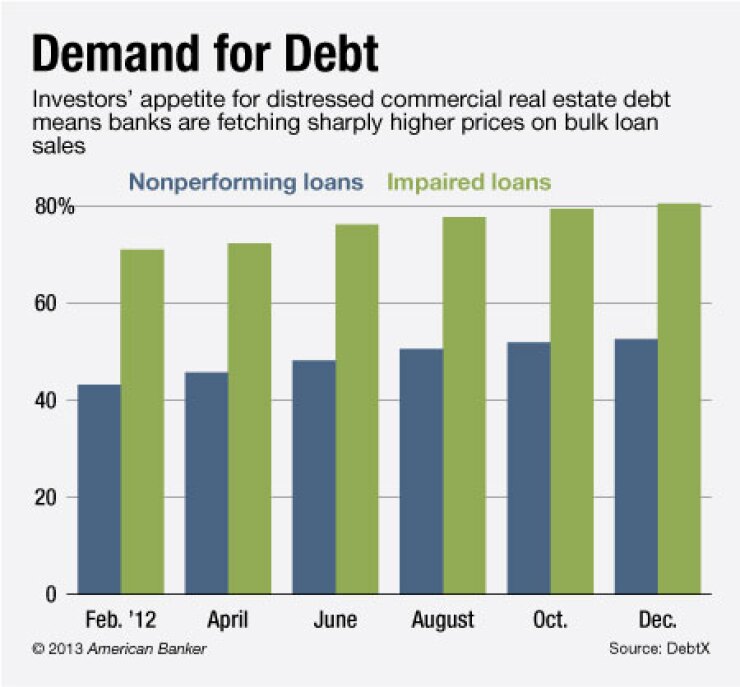-
Banks will finally start to sell more distressed loans this year, and buyers will have to be careful not to overbid, PennyMac CEO Stanford Kurland says.
February 14 -
More banks have sold problem assets to private-equity groups this year, while others unloaded their banks in hopes of unlocking the value in nonperforming assets. Some believe selling bad loans to nonbanks could shore up valuations by removing the challenges of regulatory oversight.
November 14

Banks are moving both residential and commercial loans off their balance sheets at a faster pace and at higher prices than at any time since the beginning of the financial crisis.
Several major banks including Bank of America (BAC), Citigroup (NYSE:C), HSBC and Wells Fargo (WFC)
Through the first two months of this year, sales of more than $5.2 billion of residential loans and $1.9 billion of commercial loans were announced, a pace that could lead to a 20% to 40% jump in overall sales this year, says David Tobin, a principal at Mission Capital Advisors, a New York loan advisory firm.
"Banks are clearing more stuff off their books and what's driving the increase is pricing," says Tobin. "It's a virtuous cycle upward, kind of like a short squeeze. There's not a lot of inventory, lots of people are trying to buy and that drives nonperforming loan prices higher."
Rising real estate values, a shrinking inventory, historically low interest rates and an abundance of capital that needs to be deployed by institutional investors are all factors spurring bulk loan sales of both commercial and residential loans.
On the residential side, the largest banks that signed onto the $25 billion national mortgage settlement a year ago have been incentivized to whittle away at the so-called shadow inventory by modifying large numbers of seriously delinquent loans that otherwise were headed to foreclosure. They also have increased short sales, in lieu of foreclosures, making buyers more comfortable that property values have firmed and are no longer on the decline.
"The shadow inventory is nowhere near the peak that it used to be before the national mortgage settlement," said Stew Larsen, head of mortgage banking at $63.3 billion-asset Bank of the West, the San Francisco-based unit of France's BNP Paribas.
To be sure, home prices are still 29% below their peak in 2006, according to the S&P/Case-Shiller Index, a housing barometer. Still, home prices jumped 6.8% in December compared with a year earlier, the largest gain since July 2006, Case-Shiller reported last week. Meanwhile, the inventory of homes for sale fell 16.5% in January from a year earlier, to 1.5 million homes, the lowest point since 2007, according to the National Association of Realtors.
"Banks have had to hold off on foreclosures and underwater borrowers don't want to sell so there so there's definitely a squeeze, which has depressed inventory," says Dean Williams, chairman and co-founder of Tulsa, Okla., auction house Williams & Williams. The company, which sells $2 billion in residential real estate through live auctions, has seen sales and property volume jump 50% since 2009.
Yet bulk sales may also be causing inventory shortages. Large private-equity firms and hedge funds have rushed in to purchase single-family homes in bulk to manage as rentals, bidding up prices. Blackstone Group (BX), Colony Capital LLC and Two Harbors Investment (SBY) are among the major purchasers.
"It's musical chairs among giant pools of managed capital," said Williams.
The Department of Housing and Urban Development will be one of the largest sellers this year, promising to unload $3 billion of distressed loans in the first half. Bank of America sold a $170 million portfolio of nonperforming loans in the fourth quarter, its first major sale since the downturn, says Tobin. Wells Fargo, which has been a regular seller of distressed debt, offloaded a $555 million portfolio of nonperforming loans in January.
Tobin expects distressed single-family loan sales to jump 40% this year, to $18.2 billion, up from $12.7 billion in 2012.
Distressed commercial sales also are heating up. Better pricing for bulk loan sales has meant more community banks can sell their legacy assets and focus on lending again.
"Two years ago, a smaller bank with limited capital could not sell," says Pat Jackson, chief executive of
Kingsley Greenland, the president and CEO of the Debt Exchange, known as DebtX, in Boston, says there were more bank sellers in the fourth quarter than he's seen in a long time primarily because prices for nonperforming commercial loans have risen 12 percentage points from a year ago.
"It's far easier to sell and clean up your balance sheet, move the assets behind you and the world is a better place," he says.
Frank Innaurato, a managing director of structured credit ratings at Morningstar, says investors' appetites for distressed real estate of all types is evidenced by a jump in sales at web sites like Auction.com, an Irvine, Calif., online marketplace.
"There's been a tightening of the bid-ask spreads, interest rates have remained low and lending has started to improve," he says. "There's an underlying belief that there's going to be more capital in the market so there will be an appetite for [nonperforming loan] portfolios that perhaps can be turned around."





